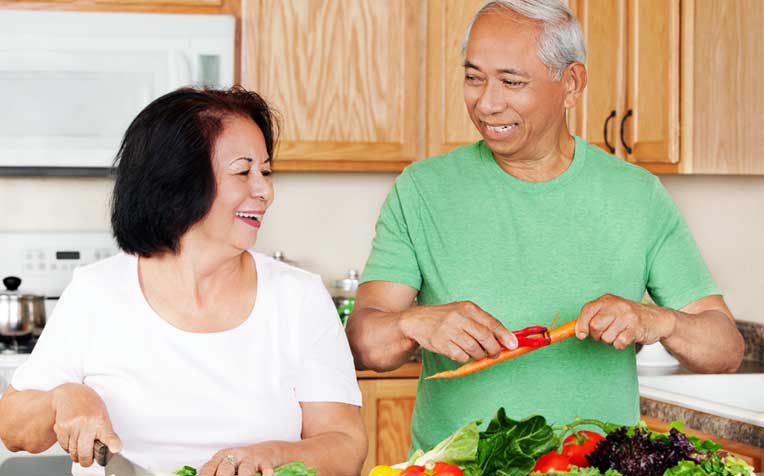
Eating a well-balanced diet helps to keep you healthy as you age.
Seniors need to be mindful of their diet but can be malnourished if they are unaware of how the body changes with age.
For example, after the age of 50, the stomach produces less gastric acid which is needed to absorb vitamin B12, and the body produces less of the hormones needed to maintain bone density.
People also tend to lose their ability to taste sugar and salt with age, and may not have as strong a sense of being thirsty. These and other changes could result in the elderly not getting the essential nutrients they need, making them anaemic, lethargic, dehydrated, and prone to osteoporosis (brittle bone disease).
Ms Mary-Ann Chiam, Head of Dietetics and Nutrition from Bright Vision Community Hospital (BVCH) shares more. BVCH is managed by SingHealth Community Hospitals (SCH), a member of the SingHealth group,
Ms Chiam said, "It is vital for people to change their diet with age. Making the effort will significantly improve their health."
She advises them to choose dishes with nutrients which they tend to be deficient in. These include:
Iron,
Calcium, and
Vitamins B12 and D
A diet low in iron and vitamin B12 can lead to anaemia which causes lethargy. Iron and vitamin B12-rich foods include liver, lean meat and fish. Iron can also be found in dark green leafy vegetables. Vegetarians can get their vitamin B12 from fortified soy milk.
6 Diet tips for seniors: What to eat
Calcium and vitamin D help maintain bone density.
Milk, cheese and dairy products are rich in calcium. Alternative sources for those with lactose intolerance are green leafy vegetables and small fish with edible bones. Vitamin D is present in oily fish, eggs and cheese, and obtained naturally by exposing the skin to sunlight.Fibre and fluids help prevent constipation, which is common in the elderly.
Good sources of fibre are wholemeal bread, brown rice, oats, vegetables and fruit. Seniors should drink six to eight glasses of water a day or nutrient-rich liquids such as milk, soya milk and soups. Soft drinks, which contain sugar but no beneficial nutrients, should be avoided.Have nutrient-dense meals as seniors tend to have poorer appetites.
"Diseases can cause dysregulation of satiation, which results in the elderly feeling full quickly, and before they even consume the ideal amount of nutrients," said Ms Chiam. So, it is important to have nutrient-dense meals.Ensure a balanced meal from the major food groups.
Their plate should be half filled with vegetables and fruits, a quarter with whole grains and the rest with meat and other proteins. The food must be low in saturated fat, trans fat, salt and added sugar, and come in a variety of colours, as colourful fruits and vegetables have nutrients that help prevent disease.Have smaller, more frequent meals throughout the day.
For those who cannot stomach a full meal, food can be made more palatable by including more naturally sweet foods like fruit, peppers and yams, and flavouring food with garlic, herbs and healthy oils instead of salt. If their teeth are in poor condition, they are encouraged to choose soft foods such as steamed egg, pureed fruit and custards.If seniors cannot get all the nutrients from food, they should consider supplements, but only after a full medical nutrition therapy assessment.
"Each elderly person's nutritional status differs, so there is no one answer that fits all with respect to supplementation. As a general rule, if a senior omits any food group in its entirety, for example all vegetables and fruit, then they will need a vitamin supplement as a start," said Ms Chiam.
Ref. Q15
Contributed by


















 Get it on Google Play
Get it on Google Play